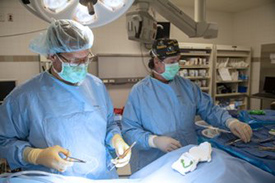Office of Research & Development |
 |
October 7, 2021

Photo by Bill George
Frail surgical patients, even those undergoing minor surgeries, are at higher risk of death than those who are more physically strong, according to a VA-funded study published in 2020. VA researchers have used this information to create a clinical tool to screen frail elderly patients before they have surgery. The department began using this screen nationwide in 2021.
Frailty refers to overall physical weakness and is common in older adults. Frail patients have lowered resilience, energy, and ability to cope with stress. Physical signs of frailty include weakness and slowed activity. Besides aging, health problems such as cardiovascular disease play a part in patients becoming frail. Physical fitness seems to protect against frailty to some extent.
VA’s 2020 study looked at data on more than 400,000 Veterans who had non-cardiac surgeries at a VA facility. Of that group, 8.5% were considered frail and 2.1% were very frail. Some of the surgeries, like hernia surgery, appendectomies, and cyst removal were considered low-risk. Moderate-risk surgeries included amputation; arterial plaque removal; and knee, shoulder, and hip replacement. High-risk procedures included open surgeries on the aorta, lungs, liver, or pancreas.
The research team found mortality rates for frail and very frail patients were “alarmingly high” across all levels of surgery, compared with stronger patients. Even after low risk surgeries, 1.6% of frail patients and 10.3% of very frail patients died within 30 days of the procedure.
To combat this, Dr. Daniel Hall, a researcher and surgeon at the VA Pittsburgh Health Care System, and his colleagues developed a clinical tool to screen elderly patients before their scheduled surgeries. The Surgical Pause Practice screens for frailty in approximately 30 seconds using a risk analysis index the team developed. If patients are found to be frail, they are referred for further evaluation before surgery is performed, and a plan is developed that clarifies the goal of the surgery as well as “prehabilitating” patients to make them better able to withstand the rigors of the procedure.
After being tested at 11 VA medical centers, the screening tool was made available nationwide on Sept. 13, 2021. At one test site, the Omaha VA Medical Center, overall mortality rates among frail Veterans scheduled for surgery dropped from 25% to 8%. The research team is working with the VHA Innovation Ecosystem Diffusion of Excellence program; VA’s National Surgery Office; and VHA’s Office of Physical Medicine and Rehabilitation Services to roll out the Surgical Pause tool throughout the system. The practice has been awarded Gold (highest) status by the Diffusion of Excellence program.
Principal Investigator: Dr. Daniel E. Hall, VA Pittsburgh Health Care System
Selected publications:
The surgical pause practice is saving Veterans’ lives, VA Center for Health Equity Research and Promotion, Sept. 22, 2021
Study raises new warnings about frail surgery patients, VA Research Currents, Nov. 13, 2019
Association between patient frailty and postoperative mortality across multiple noncardiac surgical specialties. George El, Hall DE, Youk A, Chen R, Kashikar A, Trickey AW, Varley PR, Shireman PK, Shinall MC Jr., Massarweh N, Johanning J, Aruya S. JAMA Surg. 2021 Jan 1;156(1):e205152. Epub 2021 Jan 13.
Association of preoperative patient frailty and operative stress with postoperative mortality. Shinall MC Jr. et al. JAMA Surg. 2020 Jan 1;155(1):e194620. Epub 2020 Jan 15.